Today’s YouTube channels are better at grabbing viewer attention than even 60-year-ahead primetime television. With 2.5 billion monthly users worldwide, YouTube has quickly become more than just a video-hosting platform. Now, it’s a prominent video marketing channel for every savvy business to reach more potential customers and increase conversions.
The thing is that leveraging YouTube to bring more sales isn’t as simple as creating a new channel and uploading videos. Over 51 million other channels are vying for attention. It’s a battle for eyeballs out there.
The key here is to make sure that your videos are properly optimized for ranking and that they drive traffic to your website or store. In this blog post, we will talk about why we should optimize our YouTube channel and how to bring more conversions from it.
YouTube channel optimization for business
A business can have the best product or service in the world, but it means nothing if potential customers don’t know about it. The same logic applies to YouTube channels.
Creating great video content is essential, but that’s only half the battle. The other half is making sure that as many people see your videos as possible. That’s where YouTube optimization comes into play.
YouTube optimization is the process of making your channel and videos more visible and easier to find on YouTube. When you optimize your YouTube channel, you make it easier for people to find your videos. And when people can find your videos, they are more likely to watch them. That leads to more views, subscribers, and, ultimately, customers.
Optimizing a YouTube channel is all about setting up your channel and videos professionally, so you acquire an edge over your competition because they know that you’re running the channel seriously.
How to optimize your YouTube channel for more conversions
Now that we know why optimizing your business YouTube channel is so important let’s talk about how to do it.
Use keywords strategically
The first step in optimizing your YouTube channel is to use keywords strategically. Keywords are the words and phrases that people search for on YouTube. When you use the right keywords, your videos will show up in those searches. That means more views and subscribers for you.
To find the right keywords, you can use the YouTube autocomplete on the search bar. For example, if you want to create a video around AI-powered content marketing tools (which is one of the most talked-about topics nowadays), you can start by typing the main keyword and see what comes up.
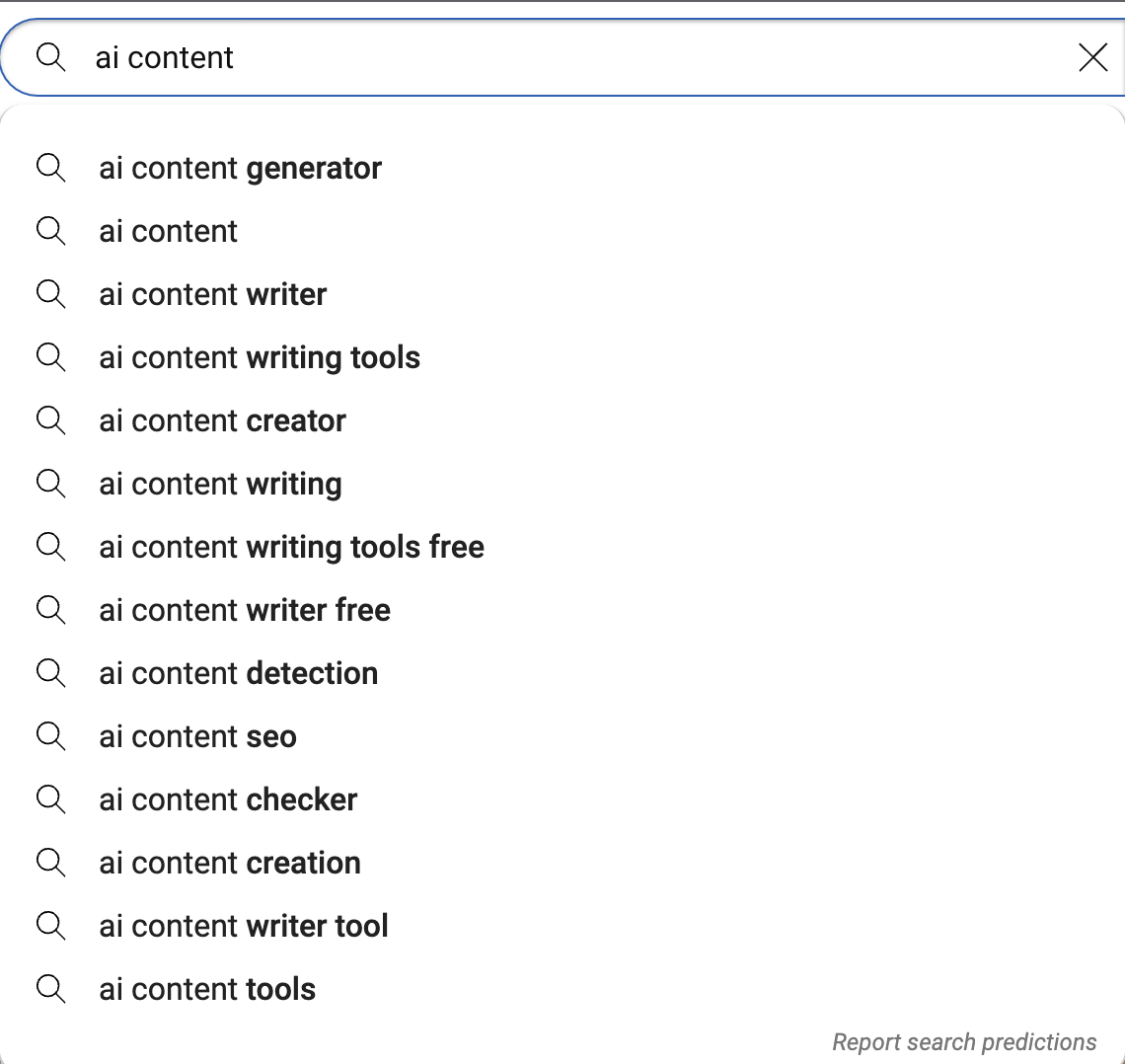 After you type a keyword into the YouTube search box, a dropdown menu appears, suggesting additional phrases
After you type a keyword into the YouTube search box, a dropdown menu appears, suggesting additional phrases
Once you have a list of keywords, use them in your video titles, tags, and descriptions. That way, YouTube knows what your videos are about and can match them with relevant searches.
Create catchy titles and descriptions
Another important part of optimization is creating catchy titles and descriptions for your videos. Remember, you only have a few seconds to grab someone’s attention on YouTube. That’s why your title and description need to be interesting and informative.
Your title should give people an idea of what your video is about. It should also be keyword-rich so that it shows up in relevant searches.
We use Linus Text Tips, for example, here. This channel uses a not-so-stiff tone for their video titles while still including a main keyword.
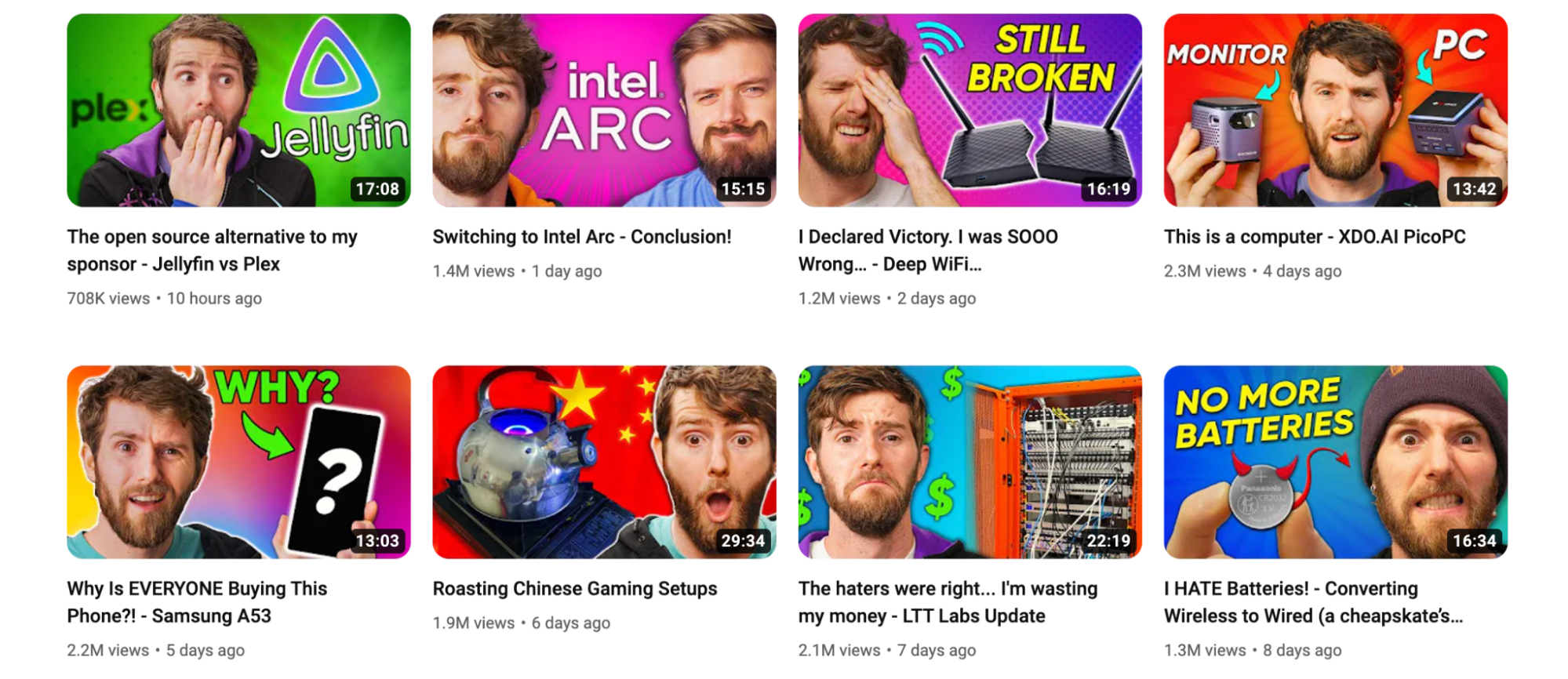 Including headlines on the thumbnails is a great way to entice audiences to click on the video, even when they aren’t convinced by the title you put
Including headlines on the thumbnails is a great way to entice audiences to click on the video, even when they aren’t convinced by the title you put
As for the description, use it to tell people more about your video. You can also include links to your website or product in the description. Just make sure the links are relevant to the video.
Upload channel art
When people land on your YouTube channel, the first thing they see is your channel art. This is the image that appears at the top of your channel. It’s important to have high-quality channel art that represents your brand.
You can also use it as a medium to give potential subscribers a sneak peek into your business or channel, just like Breadnbeyond did.
 Channel art can convey key information about your channel, including your upload schedule, tagline, social media accounts, and more
Channel art can convey key information about your channel, including your upload schedule, tagline, social media accounts, and more
Your channel art should be 2560 x 1440 pixels and under 4 MB. You can upload it directly from YouTube or design it in Photoshop.
Optimize your thumbnails
Your thumbnail image is what appears next to your video titles on YouTube. It’s important to have a thumbnail that is relevant to your video and catches people’s attention.
There are a few things to keep in mind when optimizing your thumbnail image:
- use high-resolution images (1280 x 720 pixels);
- use images with little or no text.
Graphic design tools like Canva, PicMonkey, and Adobe Photoshop provide you with pre-built YouTube thumbnail templates that can help you create great captivating thumbnail images in minutes, even without zero design skills. Using a professional thumbnail maker for Youtube can significantly enhance the visual appeal of your thumbnails, making them more eye-catching and increasing the likelihood of viewers clicking on your videos
Take a look at Ahrefs, which uses the same thumbnail design to maintain brand recognition.
 Design consistency is an important step in a thumbnail, as it allows the audience to understand the concept of your videos
Design consistency is an important step in a thumbnail, as it allows the audience to understand the concept of your videos
Add annotations and end screens
Annotations and end screens are two features that can help you gain more viewers for other YouTube videos and even drive traffic to your website or product from your YouTube videos.
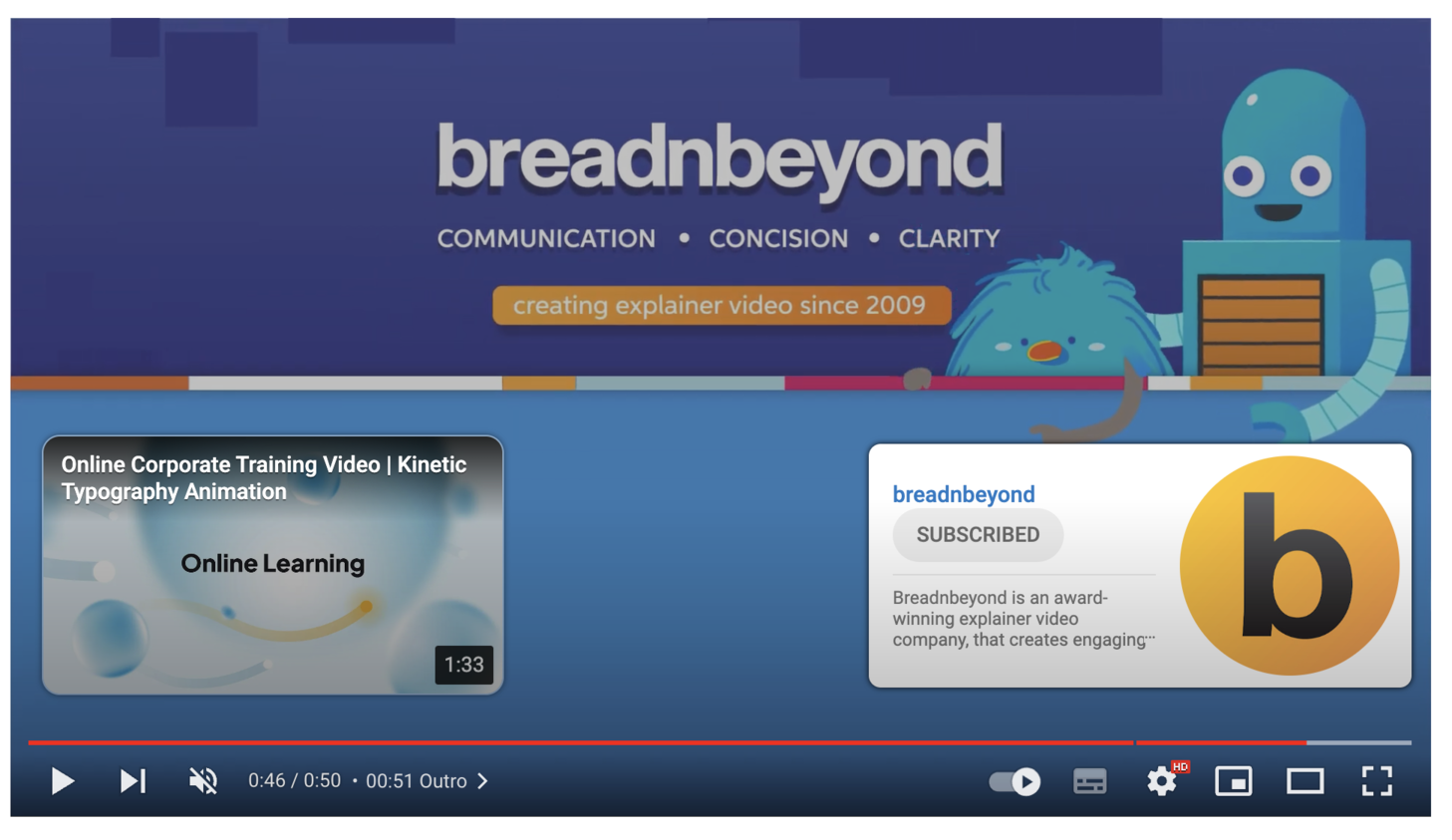 You can use the end screen to promote other videos, encourage viewers to subscribe, and more
You can use the end screen to promote other videos, encourage viewers to subscribe, and more
Annotations are little notes that you can add to your videos. They can be used to promote other videos on your channel, give people more information about your video, or link to external websites.
End screens are images that appear at the end of your video. They can be used to promote other videos, channels, or websites, helping you generate more leads.
By including both annotations and end screens in your videos, you can increase the chances that people will click through to your website.
Add subtitles and closed captions
Adding subtitles and closed captions to your videos is a great way to make them more accessible to viewers across the globe and people with hearing impairments.
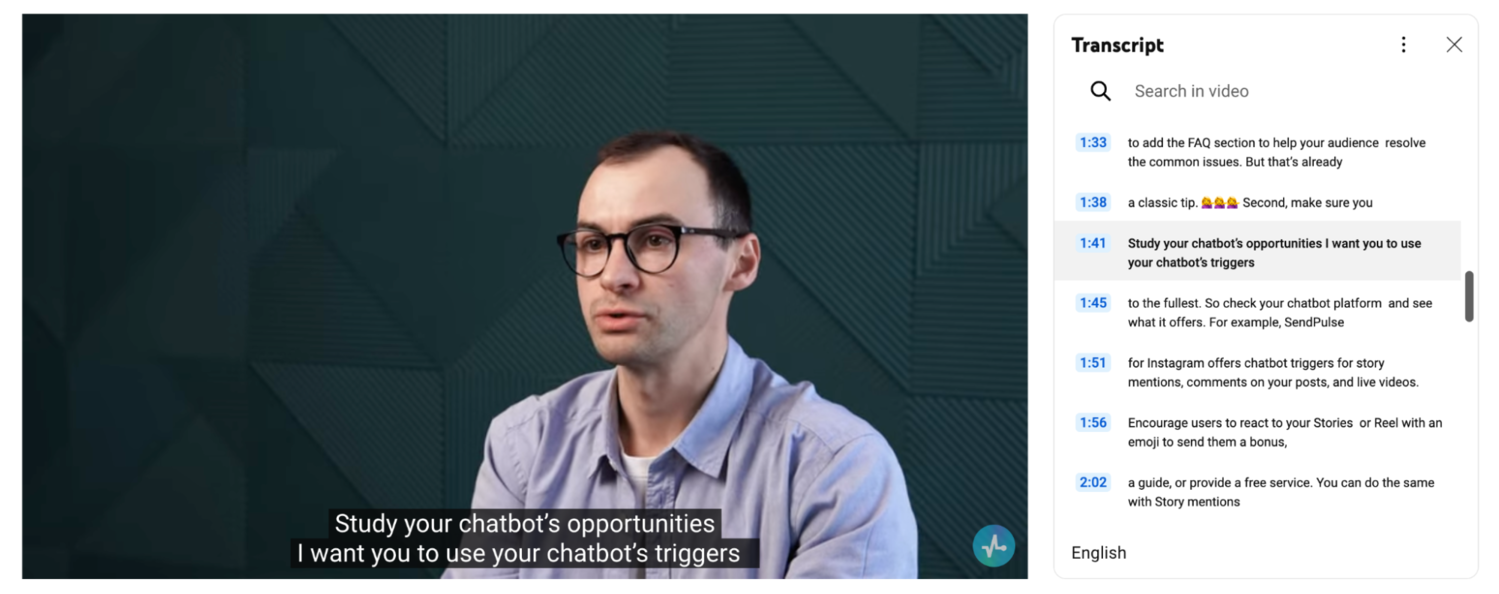 Subtitles and captions can help Googlebot read your video content, making it impossible for your content to rank higher in the search engine
Subtitles and captions can help Googlebot read your video content, making it impossible for your content to rank higher in the search engine
It’s also a good idea from an SEO standpoint. That’s because YouTube can index the text in your subtitles and use it to match your video with relevant searches.
How? YouTube uses automatic captioning, which isn’t always accurate. So, it’s a good idea to create your own subtitles or closed captions. YouTube supports several file formats for subtitles/CC, including SRT, SBV, ASS, VTT, and others.
Optimize your playlists
Playlists are a great way to organize your videos on YouTube. Playlists keep viewers engaged by automatically playing related videos, leading to longer watch time on the platform. It also helps improve discoverability as it appears in YouTube search results and can be easily discoverable by users looking for related content.
Here’s an example of a well-created playlist from Ahrefs.
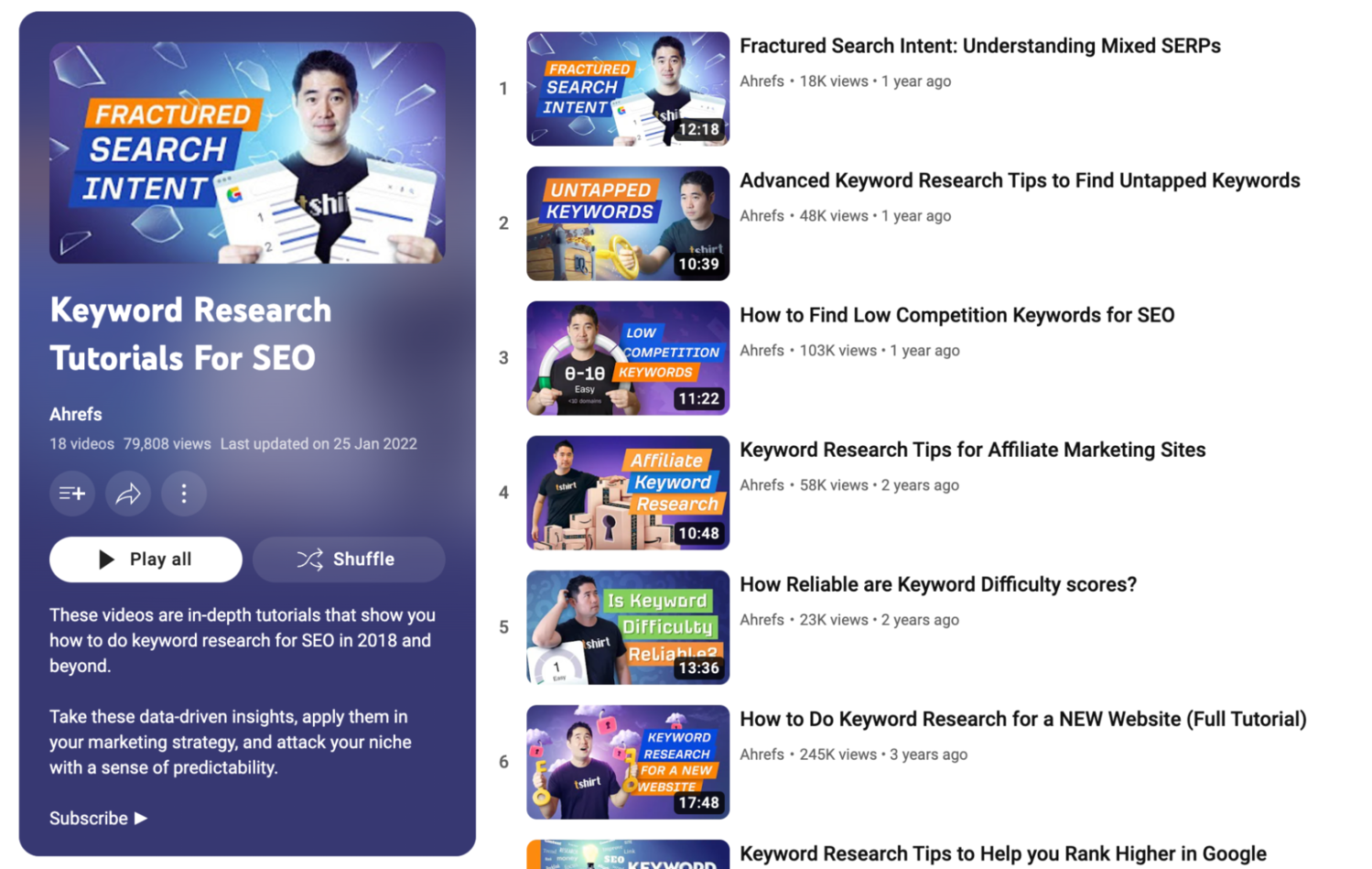 Playlists allow you to group related videos and make it easier for users to find what they want based on the topic
Playlists allow you to group related videos and make it easier for users to find what they want based on the topic
Optimize for mobile
YouTube mobile viewing accounts for 63% of total viewership. So, optimizing your videos for mobile will ensure they look and perform well for most viewers.
Optimized videos are more likely to play smoothly on mobile devices, providing a better user experience and reducing frustration for viewers. In other words, making your videos mobile-friendly can help you keep viewers engaged, leading to longer watch time and more opportunities for engagement.
Mobile-friendly here means that all the visuals and elements on the video are big enough to be seen on a smaller screen. And there’s a subtitle or caption, as many users prefer to watch from mobile.
Create a consistent brand image
YouTube channel optimization isn’t limited to how you set up your channel. It’s also important to create a consistent brand image across all of your videos. This means using the same colors, fonts, and logos in your channel art, thumbnails, and videos. Or, you might consider creating intro and outro videos to use on all of your videos.
SendPulse’s YouTube channel uses the same design and color palette for all of their elements, from channel art to thumbnails.
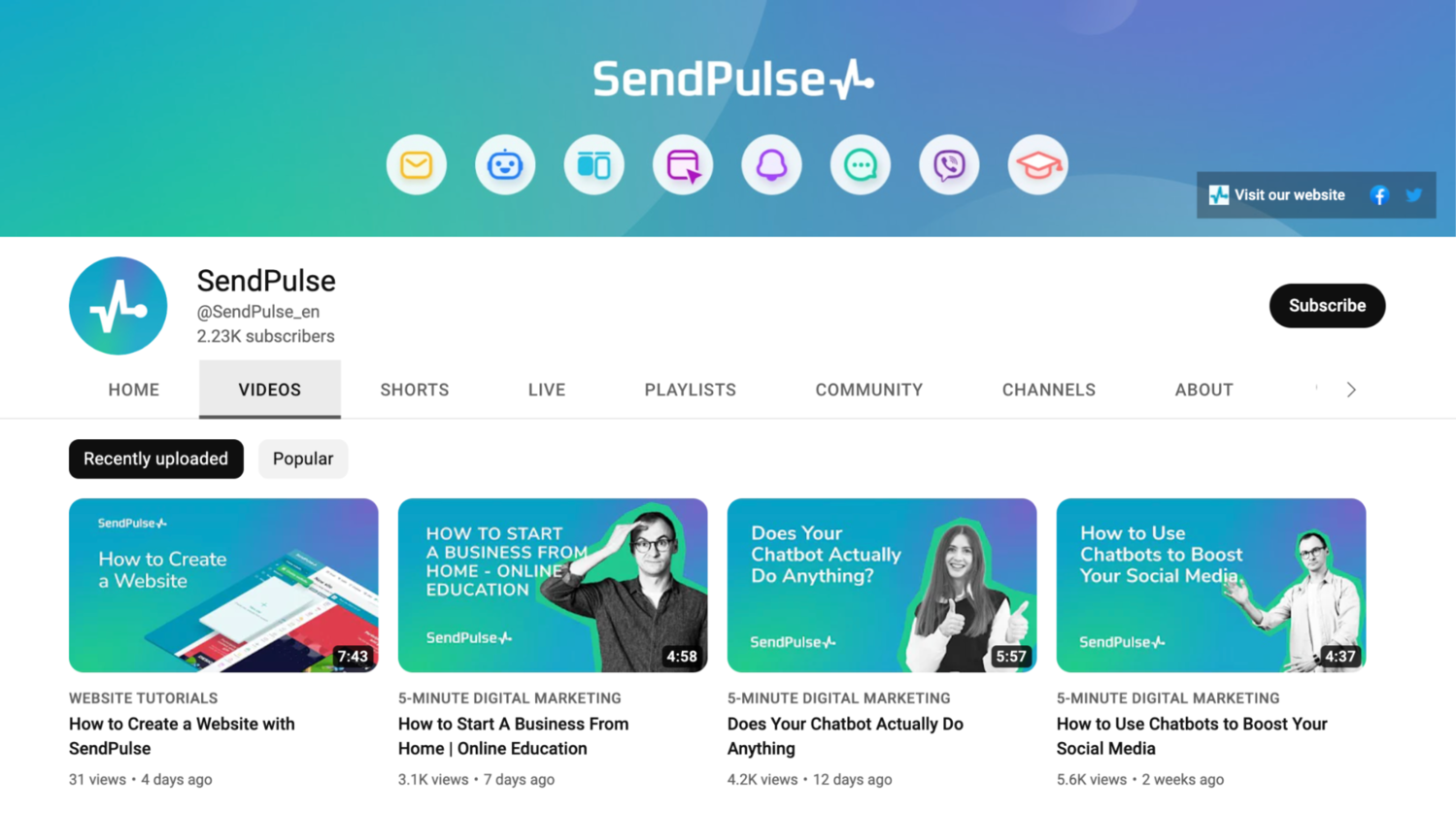 Brand consistency is about being recognizable, establishing trust, and communicating personality
Brand consistency is about being recognizable, establishing trust, and communicating personality
Creating a consistent brand image makes your channel more recognizable and trustworthy. This will help people recognize your brand, even if they’ve never seen your channel before. It also makes your channel look more professional and put-together.
People are more likely to watch your videos and subscribe to your channel if they know what to expect from you.
Upload videos regularly
Consistency is key when it comes to YouTube marketing. If you want people to keep coming back to your channel, you need to upload videos regularly.
How often you upload videos depends on your audience and the type of content you create. But, in general, it’s a good idea to upload at least one video per week. That way, people know when to expect new content from you and are more likely to subscribe to your channel.
The Community Tab is a feature on YouTube that allows you to interact with your audience directly on your channel page. You can use the Community Tab to share text posts, images, and videos with your subscribers and start discussions with subscribers by asking questions or posting polls.
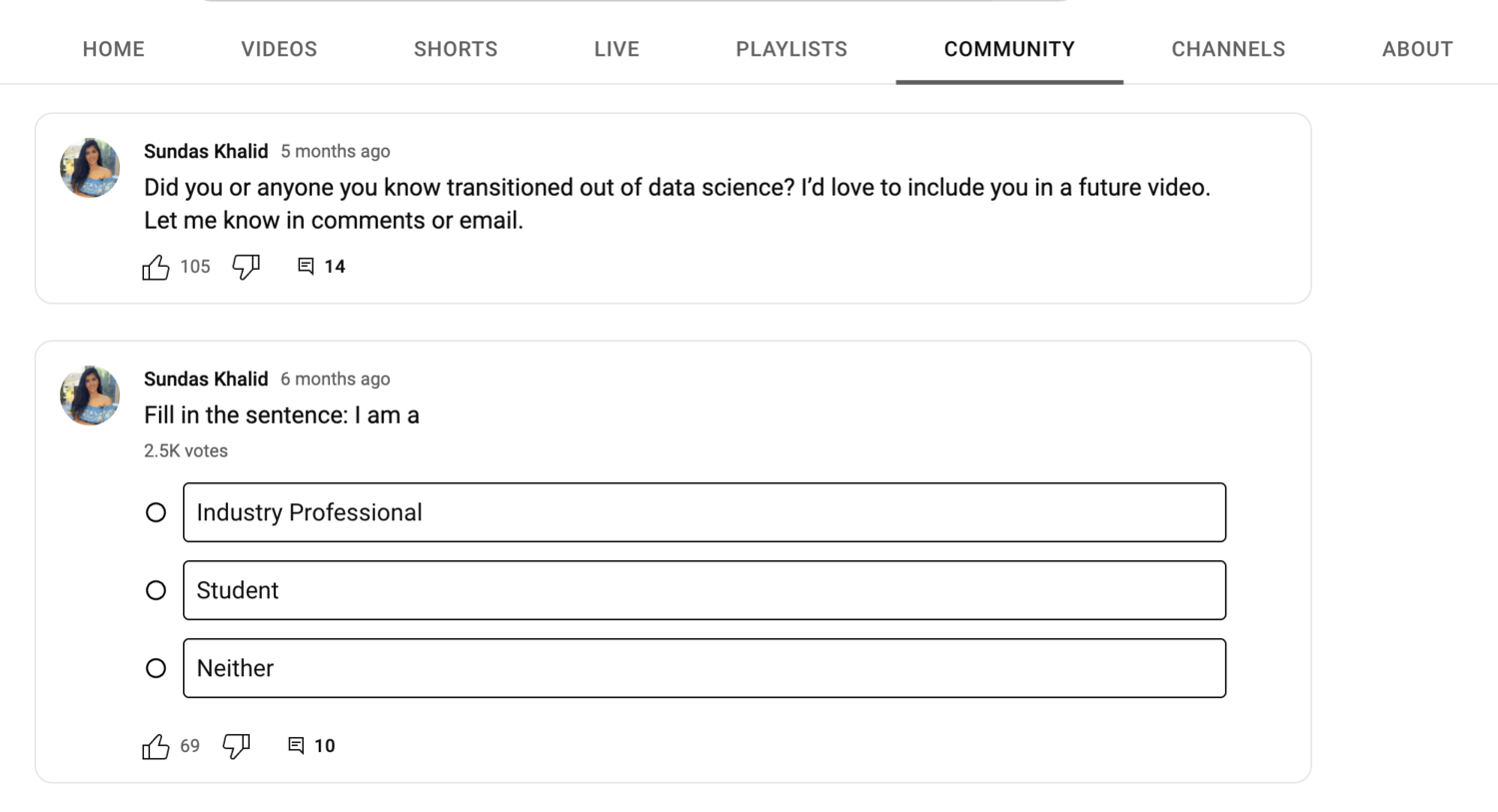 You can use the YouTube Community Posts to create polls, text-based posts, and images to engage and create conversations with your audiences
You can use the YouTube Community Posts to create polls, text-based posts, and images to engage and create conversations with your audiences
This is a great way to stay connected with your viewers and get feedback about your videos.
Jump into the Shorts bandwagon
YouTube Shorts is a new feature that allows you to create short, vertical videos. These videos can be up to 60 seconds long and are perfect for mobile viewing.
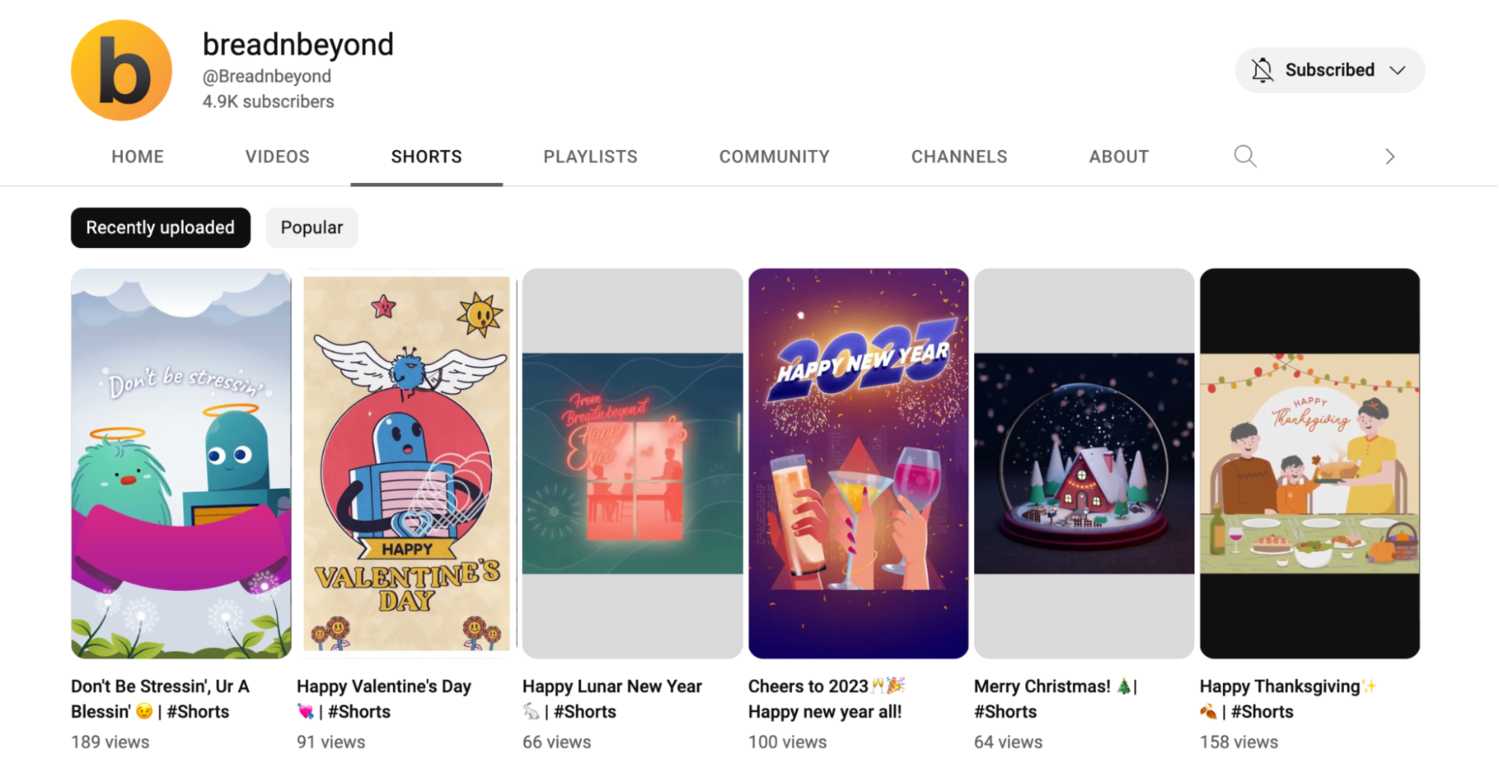 Shorts get more eyes onto your channel, and that can bring new eyes to your main videos
Shorts get more eyes onto your channel, and that can bring new eyes to your main videos
The great thing about this TikTok-style video feature is that you don’t need a lot of equipment or editing skills to create them.
You can just shoot a quick video on your phone and upload it directly to YouTube. This is a great way to reach out to people who are used to watching short videos on their phones.
Wrapping up
YouTube channel optimization is to spruce up your channel, providing the best experience for viewers and subscribers. Meanwhile, at the same, a well-optimized channel with high-quality content and a strong brand image can help establish your business as a credible and trustworthy source of information on the platform.